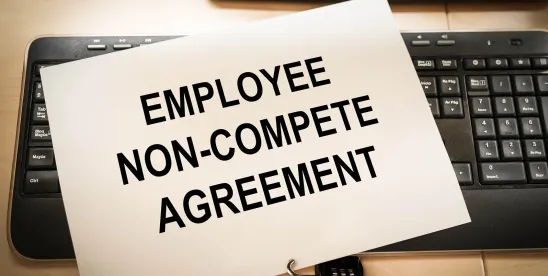The Federal Trade Commission (FTC) voted on April 23 to approve a final rule banning most non-compete agreements between employers and their workers (Final Rule). The Final Rule is scheduled to go into effect 120 days after it is published in the Federal Register, which will likely occur in the next few weeks, though legal challenges may delay the Final Rule’s effective date and FTC enforcement actions.
The most significant pieces of the Final Rule about which employers should be aware are that:
- It makes non-compete agreements with workers an unfair method of competition that violates Section 5 of the FTC Act.
- It defines “non-compete” agreement broadly “as any term or condition of employment that prohibits a worker from, penalizes a worker for, or functions to prevent a worker from” seeking or accepting employment with another business or operating a business after their working relationship ends.
- It is not limited to employees, and instead covers anyone “who works or who previously worked, whether paid or unpaid . . . including, but not limited to, whether the worker is an employee, independent contractor, extern, intern, volunteer, apprentice, or a sole proprietor who provides a service to a person.”
- It prohibits any new non-compete agreements after the effective date, including agreements with highly compensated executives. Pre-existing non-compete agreements with “senior executives,” defined as an employee earning more that $151,164 a year in a “policy-making position,” may remain in force.
- All other pre-existing non-competes are void as of the effective date, and the Final Rule requires employers to provide current and past workers notice that they will not enforce existing non-competes. Business are not required to formally rescind non-compete agreements, and the Final Rule includes model language for the notice requirement that business can use to comply with this section of the final rule.
- Non-compete agreements, as defined by the Final Rule, do not include (and are, therefore, not prohibited by the Final Rule): (i) non-competes that prohibit employees from competing against employers during their employment; (ii) sufficiently tailored non-solicitation provisions; (iii) non-compete agreements entered into in conjunction with sale of a business; and (iv) franchisee/franchisor agreements (but it does prohibit non-compete agreements with employees working for a franchisee or franchisor).
There are important limitations to the FTC’s Final Rule based on the reach of the FTC Act. The FTC Act does not apply to non-profits, banks, savings and loan companies, transportation and communications common carriers, air carriers, and some other entities. However, the Federal Deposit Insurance Corporation’s (FDIC) recent bank merger guidelines banned the enforcement of non-compete agreements for employees at banks of all sizes in certain contexts. FTC Commissioner Rebecca Kelly Slaughter also warned that non-profits registered as tax-exempt entities, but organized for the profit of members, would be subject to the FTC Act. Further, the Biden administration has issued, and likely will continue to issue, executive orders and other regulations to close any gaps in the non-compete ban due to the FTC Act’s limitations in its reach.
Companies that violate the Final Rule may be subject to civil enforcement actions and penalties.
As of the date of this posting, there have already been two notable legal challenges to the FTC’s final rule: first in Ryan LLC v. Federal Trade Commission, 3:24-cv-986 (N.D. Tex., Apr. 23, 2024) by a tax services firm in Texas federal court; then in Chamber of Commerce of the United States of America et al. v. Federal Trade Commission, 6:24-cv-00148 (E.D. Tex., Apr. 24, 2024) by the U.S. Chamber of Commerce and other business groups in another Texas federal court. These cases, and likely others, will be very active in the next several months, and may impact the scope of the Final Rule and its enforcement. Among other things, it is possible that the effective date of the Final Rule will be stayed pending the outcome of the litigation challenges.
In the meantime, employers should begin evaluating how they will comply with the Final Rule in the event it ultimately becomes effective, including the following:
- Consider whether to require certain “senior executives” to execute non-competes before the Final Rule becomes effective.
- Determine which of positions would normally require an employee to execute non-compete agreements, and consider adding other types of restrictive covenants to adequately protect the employer’s interests (e.g., the protection of its trade secrets, employees, and other confidential or proprietary information). Note, however, that, under the Final Rule, other types of restrictive covenants cannot be so onerous that they function as a non-compete.
- Review existing policies, offer letters, restrictive covenant agreements related to non-competition and identify which provisions will need to be revised in the event the Final Rule ultimately takes effect.
- Ensuring that other workplace policies and procedures adequately protect them from violations of non-disclosure or confidentiality obligations.
- Identify which current and former employees are subject to pre-existing non-competes, analyze which of those employees are “senior executives” under the Final Rule, and for those that are not, develop a plan for efficiently sending notice to each of them immediately prior to the effective date.
- Consult with counsel for advice about how to begin planning for the Final Rule.
To be clear, employers should not rush to immediately implement changes to their agreements, policies, and procedures in the coming days and weeks. Instead, employers should allow time for the litigation process to play out over the next few months to see, among other things, if the Final Rule is invalidated or, at the very least, stayed pending the outcome of the litigation.





 />i
/>i
